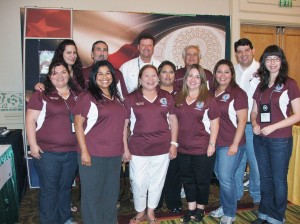Highlights From San Antonio
An item is placed on the commissioners court agenda. A discussion ensues, a vote is taken, a decision is made…and in many cases, lives are changed.
Capitalizing on the conference theme, “County Government: It Starts With Us,” South Texas 2011-12 President and Webb County Commissioner Jerry Garza asked judges and commissioners gathered in San Antonio to consider and embrace the power and responsibility of the commissioners court.
“You can make things happen,” he declared. “You can make things change.”
Some 230 county officials convened at the Hyatt Regency Hill Country Resort for the 78th Annual South Texas County Judges and Commissioners Association Conference June 18-21.
During the Opening General Session, Garza emphasized the privilege of  serving the public in a capacity that allows for growth and change.
serving the public in a capacity that allows for growth and change.
“Nothing will ever progress and move forward unless we start it,” he professed.
Building on Garza’s message, Col. William LaChance from Fort Sam Houston took the microphone and schooled the audience on strategic planning, charging officials to rise as leaders and bring plans to fruition.
As the leader, “you chart the course,” LaChance declared. “If you’re being eaten up by the day-to-day, then who’s looking forward? Who is shaping? Who is looking ahead?”
Strategic planning and goal setting mean defining what is important and “getting it done.”
“The plan is the start point, not the end point,” he continued.
So how do county leaders take a strategy and turn it into something real? The keys to plan fulfillment are accountability and leadership, or picking the right people to lead.
LaChance presented his military model for strategic planning, offering practical steps such as defining the mission, vision and focus areas, and establishing clear priorities. He closed with a six-phase plan used at Fort Sam Houston’s 32nd Medical Brigade:
- Phase I – Preparation
- Phase II – Validate Mission Statement, Vision
- Phase III – Establish Objectives in Support of Strategic Themes
- Phase IV – Develop Objective Action Plans
- Phase V – Consolidate, Publish, Communicate
- Phase VI – Track Progress
When it comes to strategic planning, counties must consider their resources, or revenue base. Clayton T. Holland with Bickerstaff Heath Delgado Acosta LLP gave a thorough rendering of county revenue sources in his presentation to officials, discussing a broad range of possibilities beyond the property tax.
“You work as a public servant,” Holland communicated. “You serve in challenging economic times. Today, Texas counties face daunting tasks to identify and develop sufficient revenue sources to supply local infrastructure and services to the people.”
Along with a review of the property tax, or ad valorem tax, Holland discussed a variety of other taxes, as detailed in his comprehensive handout. For example, counties that meet specific criteria may levy the following:
- Hotel occupancy taxes
- County sales and use taxes
- Sales taxes affiliated with special districts, such as crime control and prevention district or library district
- Venue project sales tax
- Livestock facility use tax
(For a complete listing, you may view Holland’s handout at http://vgyi.tamu.edu/2012-presentations-and-handouts-south-texas-judges-and-commissioners-conference/. Click on 2012 Presentations and Handouts.)
“Your role of public service places you squarely in the middle between competing and complex demands: unfunded state mandates, increased public demand for better infrastructure and services, and limited authority to develop revenue to meet the people’s needs,” Holland shared.
“A working knowledge of available revenue options will provide important perspective and insight regarding county fiscal policy, and at times will provide the basis for a change in that policy,” he emphasized. “Continued education by the county official will help point the way to a possible solution to the inherent problems of competing demands and limited authority.”
This year’s schedule of classes included a fairly new topic, thanks to the booming oil and gas industry. In his presentation on Preserving County Roads and Working with Eagle Ford Operators, James M. Sassin of Fugro Consultants provided background on the Eagle Ford shale (EF) and examined the related county road concerns.
v 2008 – First well drilled by Petrohawk in La Salle County.
v 2011 – 14 producing counties, six additional counties impacted with support activities, and 10 outlying counties where exploration is expected.
v Total County Road Mileage of all counties in EF:
- 12,904 = Gravel
- 16,210 = Paved
It takes 1,184 loaded trucks to bring one gas well into production, Sassin explained. In addition, the operation requires 353 loaded trucks per year to maintain the well and an additional 997 loaded trucks every five years to re-fracture the well. Translate this into car miles, and the operation equals 8 million cars plus an additional 2 million cars per year to maintain.
One truck can cause more damage than 1,000 vehicles, Sassin emphasized. However, the pavement damage can be identified, and it can be quantified. The process requires evaluation, planning including a proactive maintenance plan, and road-use agreements. (For additional details, see the related presentation at the website listed above.)
Along with general sessions and breakout classes, officials were given time to mix and mingle at a variety of social events, including the traditional pool and poker tournaments.
The conference venue at the Hyatt Regency Hill Country Resort offered a beautiful setting including a “lazy river” and golf course onsite, and nearby Sea World, where attendees were treated to a private “Shamu Showing” during Host Court Night.
Along with educational classes and social events, participants took care of Association business including the passage of six resolutions and election of the 2012-13 slate of officers. In addition, the Site Selection Committee selected South Padre Island for the 2014 annual meeting.
Mark your calendars for the 79th Annual South Texas County Judges and Commissioners Association Conference set for June 8-13, 2013, in Corpus Christi. County Progress will publish registration details in our County Calendar as they become available. H – By Julie Anderson

















